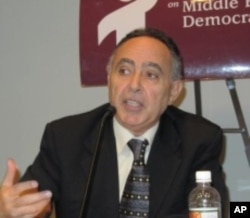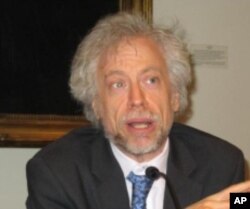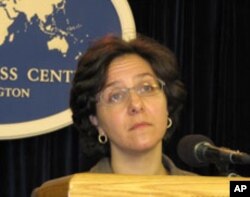Less than a year ago, U.S. President Barack Obama gave a speech in Cairo, calling for a new beginning in America's relations with the Muslim world while pledging to support the advance of democracy and human rights.
Secretary of State Hillary Clinton renewed the president's pledge just last month in a speech to the U.S.-Islamic world forum in Doha, Qatar.
But some rights activists say that, despite those American promises, freedom and human rights are still under assault across the Arab world. A new survey finds the status of human rights in the Arab region deteriorated last year, compared to 2008.
Deteriorating conditions
Twelve Arab countries are profiled in the report by the non-profit Cairo Institute for Human Rights Studies. The study finds that developments over the past year have threatened progress toward improved human rights. It suggests that governments have acted "with impunity," particularly in Egypt, to suppress dissent by illegally jailing critics and political opponents and enacting harsh anti-terrorism laws.
Baheyel-din Hassan, general director of the Cairo Institute, says an American push for real democratic reforms in Egypt could serve as a model for reform efforts across the region.
"The U.S. under the Obama administration has an exceptional moral authority, and it should use such moral authority in the right way and not… think that the U.S. has to choose between its security interests and promoting human rights," says Hassan.
He says many people in the Muslim world are beginning to doubt whether U.S. actions will ever match President Obama's stated vision of a "new way forward."
In February, U.S. Secretary of State Hillary Clinton addressed those concerns in her remarks at the second U.S-Muslim World Forum in Doha, Qatar.
"We supported and will continue to support those who build the foundations of democracy: transparent and trustworthy institutions, the rule of law, a vibrant civil society that shines a light on government abuses and those overlooked corners of society where the powerless and disenfranchised can be found," said Clinton. "But none of this can - or should be - imposed from the outside. It must emerge from citizens themselves."
Push for reform
But the director of the Cairo Institute doubts citizens will be able to act, especially in some of the Gulf region's failed states. He points to Yemen is an example of a country where U.S. aid has increased significantly, but the human rights situation has deteriorated.
"The support for authoritarian regimes does not lead only to the deterioration of human rights, but also to serious damage to the U.S. image and then motivates people to support terrorists against such despotic regime, which is supported by the U.S. administration," says Hassan.
The Cairo Institute report calls for a demonstrated, sustained commitment to helping local actors in the region realize those objectives.
Nathan Brown, a Mideast affairs analyst with the Carnegie Endowment for International Peace, says so far, such a commitment seems to be missing from U.S. Mideast policy.
"I am not sure it is within the American power to implement democracy in the Arab world, but I think it has to be some kind of integration of the most political aspects (of democracy promotion) into American policy, not necessarily the centerpiece, but as an essential element of the region's policy," says Brown.
He adds that U.S. efforts to advance democracy in the region should take into account each country's level of social and economic development.
Reaching out
U.S. officials insist the Obama administration is taking just such a nuanced approach in its efforts to promote democracy and human rights in the Arab world. Tamara Wittes, deputy assistant secretary of state for Near East Affairs, recently toured four Arab countries to assess their civil society needs.
Wittes says the Obama administration has regular conversations not only with Arab governments that have made commitments to reform, but also with democratic reform activists across the region.
"We have an ongoing engagement with civil societies, with political parties, with aspiring candidates and politicians for whom we provide training and other kinds of support and we really are engaged at the government and non-governmental levels to try to advance the ball down the field in terms of democratic reform," says Wittes.
She points out that during her recent visit to Cairo, she met openly with democracy and human rights activists to discuss their role in Egypt's upcoming parliamentary elections.












